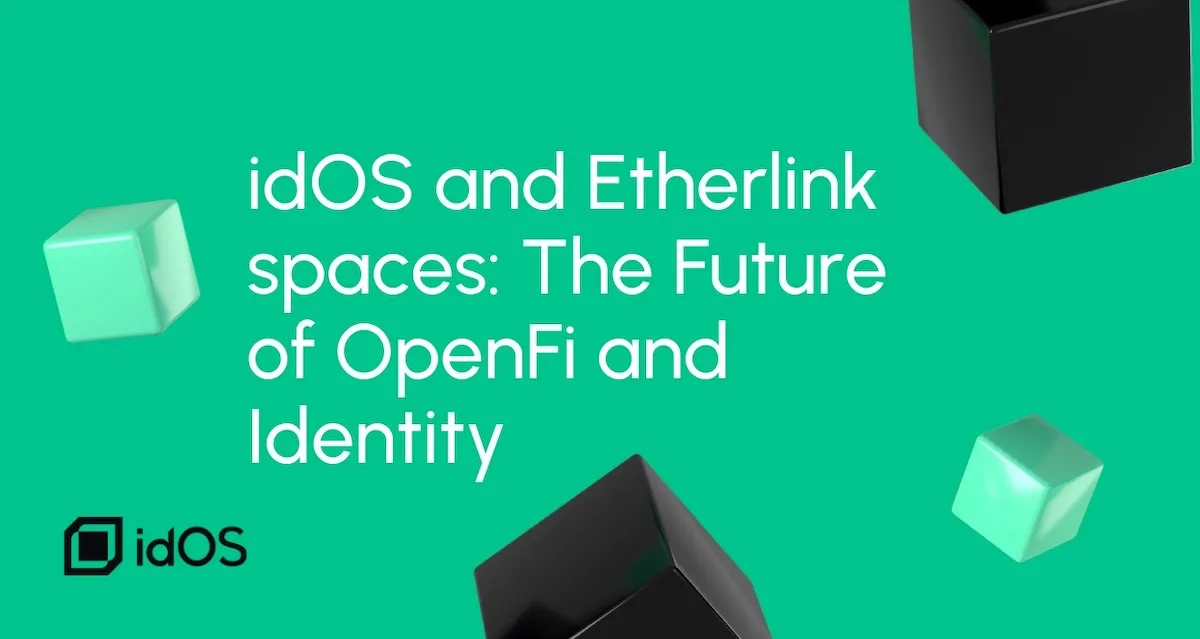idOS and Etherlink spaces: The Future of OpenFi and Identity
 Download File
Download FileIn a recent X Spaces discussion, idOS and Etherlink shared insights into the future of decentralized identity and the concept of OpenFi. This conversation unveiled how idOS is positioned at the forefront of integrating identity solutions within the broader web3 landscape to enable everyday use cases powered by web3 dApps. Let’s dive deeper into what was discussed and explore how idOS and its ecosystem are shaping the future of digital finance. Check out the X Spaces recording here.
Understanding OpenFi
What is OpenFi?
OpenFi represents a transformative shift in how we think about financial services. Traditionally, fintech applications like neobanks (e.g., Revolut, N26, Monzo) offer a closed ecosystem where users manage everything from deposits to investments within a single platform. These platforms have significant capital and operational costs due to their need to build and maintain comprehensive, closed systems and acquire necessary banking licenses in each country.
However, OpenFi envisions a more modular and composable financial system. Imagine breaking down the various financial services into specialized components that can interact seamlessly. For example, deposits might be handled by one protocol, payments by another, and lending by yet another. This composable approach leverages existing decentralized finance (DeFi) protocols and blockchain technology to create a more efficient and flexible financial ecosystem. In short, OpenFi enabled composable DeFi dApps to also work for real-world, everyday use cases.
How idOS Fits into OpenFi
The Role of idOS
idOS serves as a crucial identity layer within the OpenFi framework. By offering decentralized digital identity solutions, idOS enables users to manage and share their personal data securely and privately across various platforms. This contrasts sharply with traditional systems where users must repeatedly go through KYC processes for each service.
In the context of OpenFi, idOS provides a way for users to verify their identity once with any KYC provider, and then utilize that proof across multiple services without redundant KYC checks. This not only enhances user experience but also reduces the need for each application to build its own identity verification systems.
Lluis, Co-Founder of idOS, explains:
“Our vision with idOS is to fundamentally change how we interact with financial services by providing a decentralized identity solution that eliminates redundant KYC processes. We want to empower users by giving them control over their personal data while making it easier for them to engage with multiple applications seamlessly.”
idOS — The Current and Future Landscape
Integrating with idOS
For developers and projects interested in adopting idOS, the process is designed to be straightforward. The idOS SDK allows dApp builders to integrate decentralized identity features into their applications easily. This means that a dApp can leverage idOS to onboard verified users without the need to send them though a new onboarding journey. Instead, the KYC credentials are stored in idOS, and users can share them selectively with various applications within the Etherlink ecosystem (or any other ecosystem where the idOS is deployed).
What’s Next for idOS?
Looking ahead, idOS plans to expand its offerings significantly. Currently, the system supports basic identity and KYC functionalities. However, the vision includes adding features like:
- Enhanced Profile Management: Users will be able to enrich their profiles with additional credentials and attestations.
- Decentralized Proofs/zkTLS: For instance, a user could prove their KYC status from a CEX without needing to share sensitive data directly.
- Cross-Chain Compatibility: Today, idOS is deployed in Ethereum, Arbitrum, NEAR and Etherlink, with deployments in XRP Ledger, Aleph Zero, Radix and Gnosis Chain coming very soon, making decentralized identity universally accessible.
Lluis notes:
“We’re committed to evolving idOS into a comprehensive solution that not only supports current identity needs but also anticipates future requirements. Our goal is to create a platform where users can build rich, cross-chain profiles that offer real value across various applications.”
Key Partnerships and Adoption
idOS is in talks with several prominent players in the web3 and fintech space. Among these is Circle, an early member of the idOS Consortium and the creators of USDC. As Lluis highlights:
“Partnering with major players like Circle is a testament to the value and potential of our technology. It’s an exciting time for us as we see more interest and integration opportunities for idOS, which will ultimately benefit the entire web3 ecosystem.”
Lluis concludes:
“The future of idOS is about expanding the capabilities of decentralized identity to meet a broad range of use cases. We’re working on features that will allow users to fully leverage their identities across various platforms while maintaining the highest standards of security and privacy.”
Conclusion
idOS plays a key role for OpenFi in supporting DeFi-focused ecosystems like Etherlink by introducing a composable and decentralized approach to financial services and identity management.
For developers and users alike, idOS offers a promising path towards a more integrated and efficient financial ecosystem. As the platform continues to evolve, it will play a pivotal role in bridging the gap between decentralized finance and real-world applications.
Stay tuned for more updates on idOS and its impact on the future of digital identity and finance. If you’re interested in exploring how idOS can benefit your web3 project or personal use, visit idOS.network and get involved.
